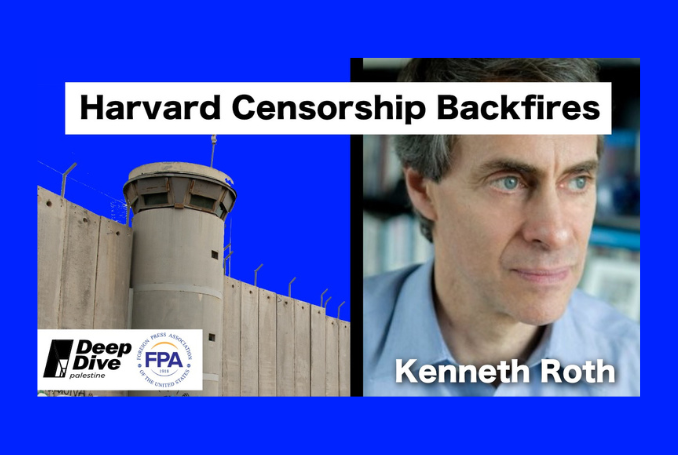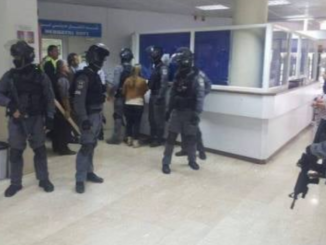
Palestine Deep Dive’s (PDD) latest show hosts human rights pioneer, Kenneth Roth, in collaboration with the Foreign Press Association (FPA) of New York.
Titled, “Kenneth Roth: On Harvard University’s ban & Why Human Rights Campaigners won’t be Silenced over Israel” deep dives into this week’s news that Roth, former executive director of Human Rights Watch (HRW) of thirty years, that Harvard University withdrew the offer of a fellowship at the Carr Center for Human Rights rescinded, reportedly over HRW critical reports on Israel.
Roth recounts that the Harvard Kennedy School department contacted him soon after he announced his retirement from HRW last year, asking if “in principle”, he would be interested in a senior fellowship position.
Agreeing, Roth said he was told, “Look, the only formality is to get the dean’s approval.”
In 2021, HRW released a damning 213-page report describing in-depth the nature of Israel’s systematic oppression of the Palestinian people, with the conclusion that beyond any doubt, Israel is practicing the crime of apartheid.
“I think it’s fair to say that the recognition that the Israeli government is committing the crime of apartheid has become the mainstream understanding within the human rights community. I actually don’t know any serious human rights activist who’s involved in this issue who doesn’t believe that,” Roth tells show host and former Al Jazeera UN correspondent, Mark Seddon.
Rather than privately accept Harvard’s decision, Roth has spoken out publicly this week on major platforms, such as on MSNBC’s Mehdi Hasan show, and also writing an opinion piece in The Guardian.
While Roth acknowledges this will not affect his future much given his extensive career at the top of the human rights field, he recognizes that he is “not the primary victim”. Rather, his concern lies with the broader issue of intimidation and academic freedom when it comes to criticizing Israel.
“This is not going to impede my future, I’ll be fine. My concern is younger academics who are going to take a message from this episode and say, ‘Oh my goodness, if I criticize Israel, that could be a career-killing move. I could face retaliation.’ That’s a horrible message to send.”
So instead of backing down, Roth wants answers from the top – from the President of Harvard University himself, Lawrence Bacow – “What is Harvard going to do?” he asks.
“My question really is partly to dean Elmendorf of the Kennedy School, but really to the Harvard president, because this is the credibility of Harvard that’s at stake. Do you stand for academic freedom or do you stand for donors who can influence the intellectual independence of your scholars? I don’t know the answer to that because Harvard isn’t talking.”
But Roth also suggests Harvard should go further than simply reinstating its offer, it should also put in place a firm policy ensuring a similar situation does not arise in the future.
“What I hope they do is to say, we get it. We messed up here and we are going to clarify that Harvard, the richest academic institution in the world, the institution that above anybody else could afford to be principled in defending academic freedom from donor influence. I would hope that Harvard says, ‘we’re going to do the right thing and we are going to announce a policy. Donors are never allowed to interfere with academic freedom. Administrators like Doug Elmendorf are never allowed to anticipate donor objections to interfere with academic freedom. We value the independence of our scholars above all else.’ That’s what I’d like to see. So far, Harvard isn’t talking.”
With an endowment of over $50bn, Harvard is considered the world’s richest university. And according to the Harvard Crimson, Lawrence Bacow earned $1.13 million in 2020 as president, while the publication also found that year that the University invests almost $200 million in companies the UN lists are tied to Israeli settlements in Palestine.
But the Kennedy School’s ties to Israel go much deeper, as Michael Massing reported this week for The Nation. According to Massing, the Wexner Israel Fellowship brings ten Israeli officials and civic leaders to Cambridge each year, including military and intelligence figures. Mondoweiss has also reported how Amos Yadlin, a retired Israeli general and a senior fellow at Harvard’s Kennedy School, praised last year’s August onslaught on Gaza that killed 15 children as an “exceptional achievement.”
If one thing is for certain, as FPA New York president Ian Williams mentions in the show, it is that Harvard’s decision has massively backfired:
“It just struck me as one of Napoleon’s marshals, when he executed the wrong person, said, this is worse than a crime, it’s a blunder. And I’m wondering if Harvard and its Israeli supporters haven’t done the same thing there because they’ve raised such an excreta storm in opposition that, Israeli human rights practices are getting far more publicity than they would do otherwise, and right across academia in the media, so they have brought the issue to the forefront.”
In agreement, Roth says, “You’re absolutely right, there’s much more attention to not only the issue of academic freedom, but also Israeli human rights violations than there would be if they just let me show up and work on my book at Harvard.”
Perhaps more attention will now be paid to the almost daily killing of Palestinians under occupation by Israeli forces, such as that of Sameer Aslan, 41, who was shot in the chest by an Israeli sniper on Thursday in Qalandiya refugee camp after protesting the arrest of his son.
According to Al Jazeera’s report, Zakariya Fayyaleh, an official with the Palestinian Authority, said a vehicle attempting to rush Sameer to the hospital following the shooting was stopped by the Israeli army, forcing him to be left bleeding on the ground. He was pronounced dead upon arrival at the hospital.
While the jury is still out on whether Harvard will adhere to the principles of academic freedom it claims to adhere to and U-turn on its decision to rescind Roth’s fellowship, Israel’s injustices against Palestinians continue apace.
With the thousands under threat of imminent expulsion in Masafer Yatta, to the five Palestinians killed in the occupied West Bank in the last 48 hours alone, as just two examples of many, it seems there has never been a more urgent time for academic freedom to be universally respected, even when it means criticizing Israel.
(Palestine Deep Dive)







